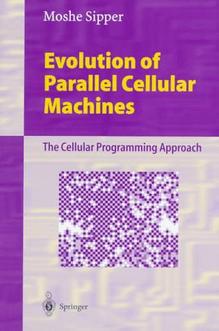Evolution of Parallel Cellular Machines: The Cellular Programming Approach

Click here for free copy
Nature abounds in systems involving the actions of simple, locally-interacting components, that give rise to coordinated global behavior. These collective systems have evolved by means of natural selection to exhibit striking problem-solving capacities, while functioning within a complex, dynamic environment. Employing simple yet versatile parallel cellular models, coupled with evolutionary computation techniques, this volume explores the issue of constructing man-made systems that exhibit characteristics such as those manifest by their natural counterparts.
Parallel cellular machines hold potential both scientifically, as vehicles for studying phenomena of interest in areas such as complex adaptive systems and artificial life, as well as practically, enabling the construction of novel systems, endowed with evolutionary, reproductive, regenerative, and learning capabilities. This self-contained volume examines the behavior of such machines, the complex computation they exhibit, and the application of artificial evolution to attain such systems.
